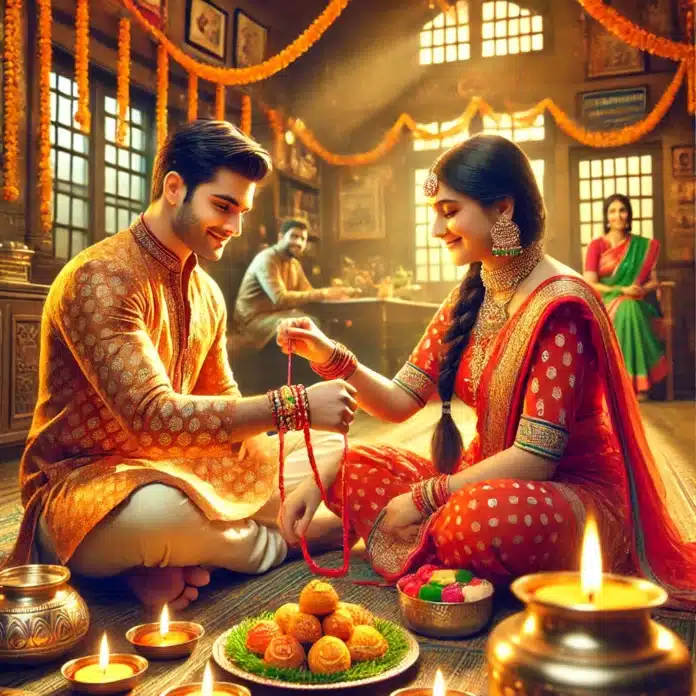Introduction
Raksha Bandhan, a festival that beautifully encapsulates the bond of love and protection between brothers and sisters, will be celebrated with great fervor and joy on August 19, 2024. This auspicious day is marked by the tying of the rakhi, a sacred thread, by sisters on their brothers’ wrists, symbolizing their love and prayers for their well-being. In return, brothers pledge to protect their sisters and offer gifts as tokens of their affection.
Historical and Mythological Significance
Raksha Bandhan has deep roots in Indian mythology and history. One of the earliest references is found in the Mahabharata, where Draupadi, the wife of the Pandavas, ties a piece of her sari around Krishna’s wrist to stop his bleeding. Touched by her gesture, Krishna vows to protect her, exemplifying the core essence of the festival – a promise of protection and care .
Another significant legend involves King Bali and Goddess Lakshmi. According to the Vishnu Purana, Lakshmi ties a rakhi around Bali’s wrist, symbolizing her plea to free her husband, Lord Vishnu, from a promise. Bali honors the rakhi and grants her wish, emphasizing the protective and respectful nature of the bond .
Regional Variations in Celebrations
North India
In North India, Raksha Bandhan is celebrated with much enthusiasm. The day begins with the preparation of special dishes and sweets. Sisters tie the rakhi on their brothers’ wrists, perform aarti (a ritual of worship), and pray for their brothers’ well-being. Brothers, in turn, give gifts and promise to protect their sisters. In Jammu, the festival kicks off with kite-flying competitions, adding a festive atmosphere to the day .
East India
In West Bengal and Odisha, the festival coincides with Jhulan Purnima and Gamha Purnima, respectively. In Odisha, it marks the birthday of Lord Jagannath’s elder brother, Lord Balabhadra. The idols are adorned with gold ornaments, and special rituals are performed in temples. The day also includes traditional games and community gatherings, reinforcing social bonds (OTV).
West India
Gujarat observes Raksha Bandhan along with the festival of Pavitropana, where devotees worship Lord Shiva and seek forgiveness for their sins. The rakhi is not just a thread of protection but a symbol of purifying one’s soul and seeking divine blessings .
South India
In Tamil Nadu and Kerala, the festival is celebrated as Avani Avittam. Brahmin men change their sacred thread, symbolizing the renewal of their vows to lead a life of spirituality and righteousness. Coastal regions of Maharashtra observe Naarali Poornima, where fishermen offer coconuts to the sea god Varuna for protection and prosperity .
Central India
In central India, the festival is known as Kajari Purnima, particularly among the farming communities. Farmers worship their land, and mothers pray for the well-being of their sons, highlighting the festival’s agricultural significance .
Modern-Day Celebrations
Raksha Bandhan has evolved over time and is now celebrated by people of various religions and communities. The festival transcends biological relationships, with friends, neighbors, and even soldiers tying rakhis to one another, symbolizing universal love and protection. In urban areas, where families may be geographically separated, sending rakhis by post or celebrating virtually has become a common practice .
Preparations and Rituals
Preparations for Raksha Bandhan begin weeks in advance. Markets are abuzz with colorful rakhis, sweets, and gift items. Families come together to celebrate, donning new clothes and performing rituals. Sisters prepare a thali (plate) with a rakhi, sweets, and a diya (lamp) for the ceremony. The ritual involves the sister tying the rakhi on her brother’s wrist, applying a tilak (vermilion mark) on his forehead, and performing aarti. The brother, in return, gives his sister a gift and vows to protect her .
Conclusion
Raksha Bandhan is more than just a festival; it is a celebration of the timeless bond between brothers and sisters. It is a day that brings families together, reinforces cultural values, and promotes love, respect, and mutual care. As the world becomes more interconnected, the festival continues to be an important occasion for Indians globally, reminding us of the enduring power of family bonds and the universal nature of love and protection.
Also Read |Celebrate Bhai Dooj 2024: Discover the Auspicious Puja, Tilak Timings, and Rituals
For more details on Raksha Bandhan 2024, Stay Tuned to Dawkco News


